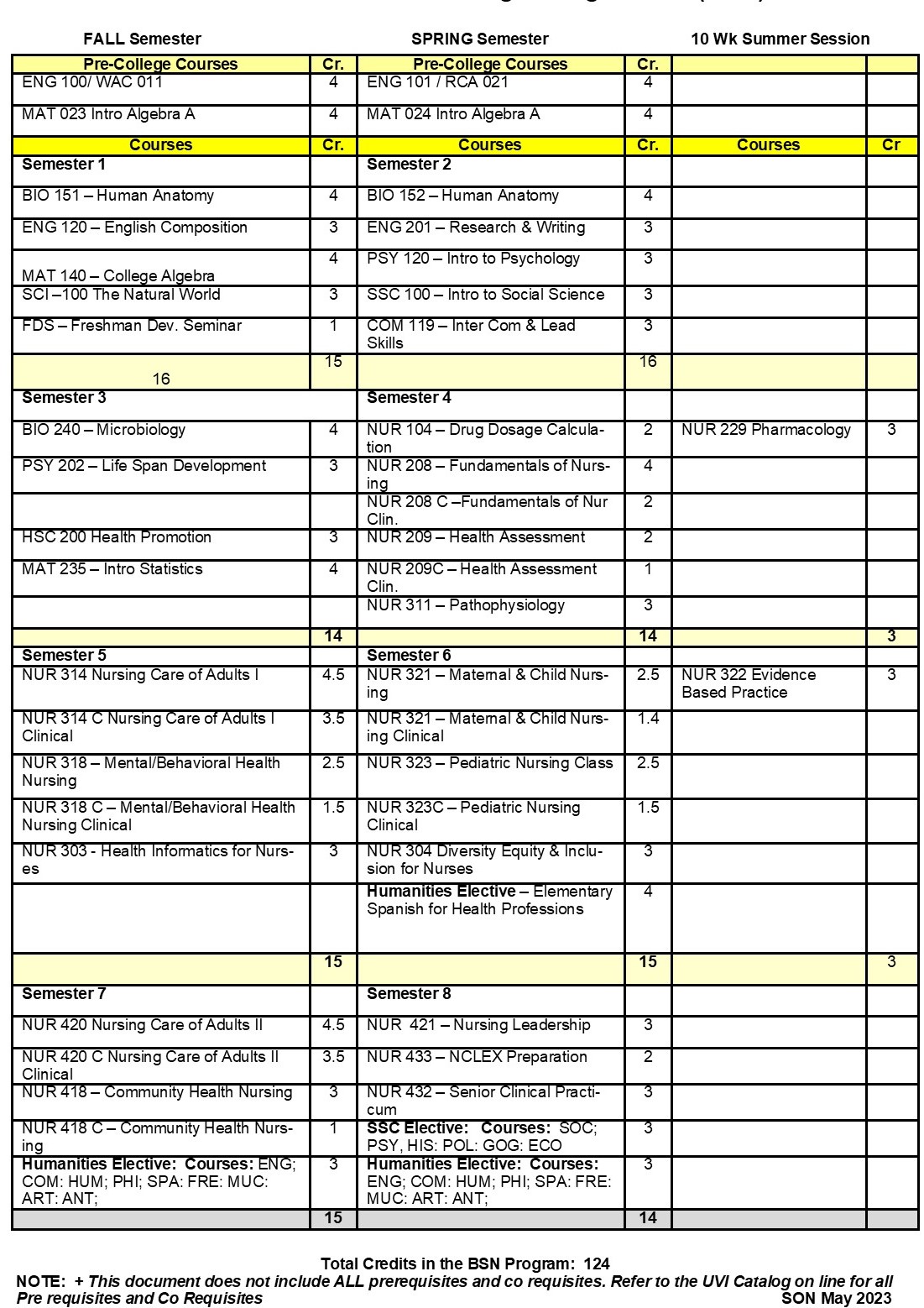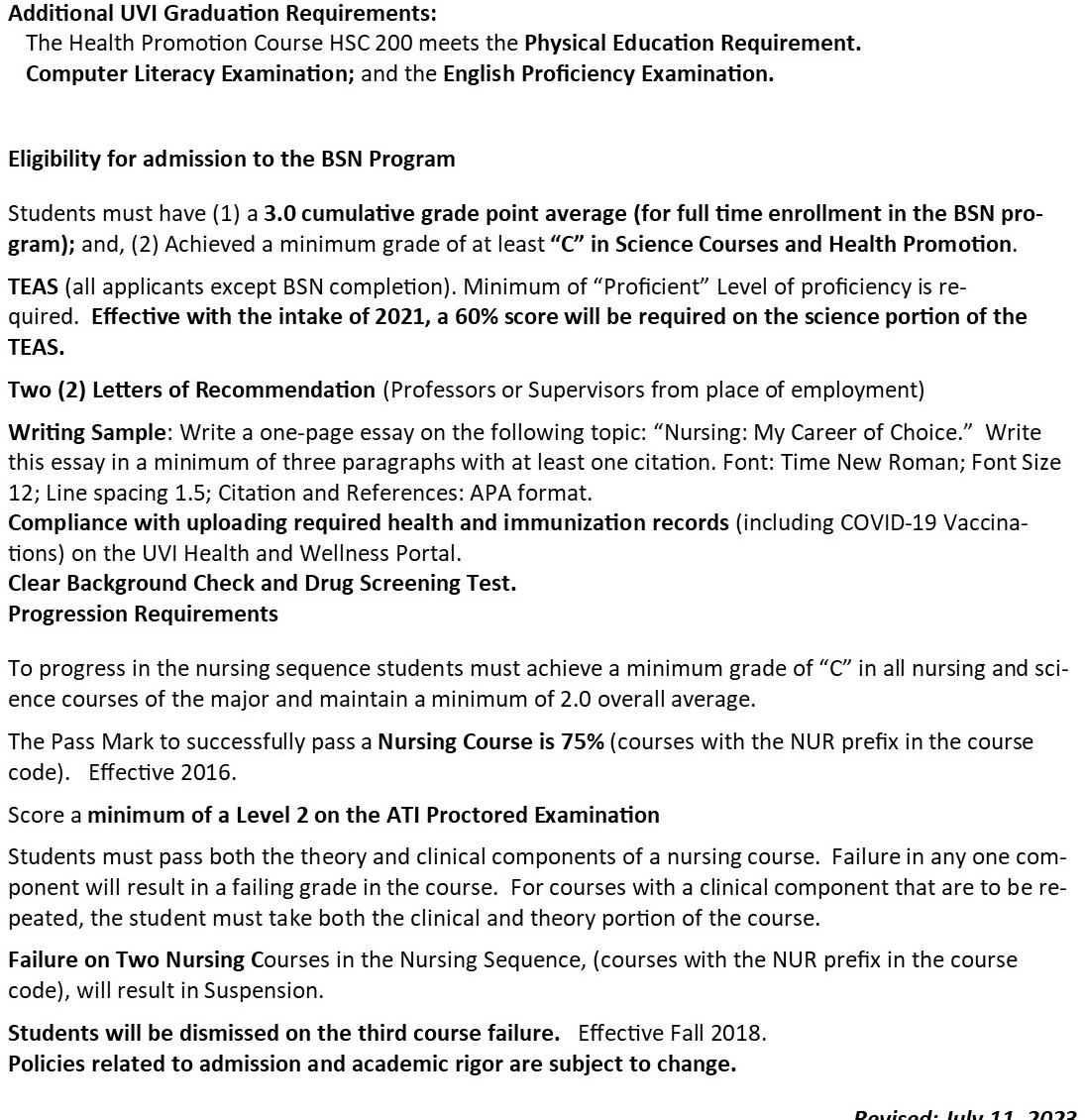
The generic BSN Program is designed to prepare the student to pass the National Council Licensure Examination for Registered Nurses (NCLEX-RN), a requirement for obtaining a license to practice as a registered nurse in the United States of America and US territories. Prospective students should be aware that the Virgin Islands Board of Nurse Licensure (VIBNL) requires a Social Security Number to be eligible to take the NCLEX-RN exam in the US Virgin Islands. Graduates may be able to sit the NCLEX-RN exam in another state. Licensure requirements may vary by state. Students should contact the Board of Nursing in the state or territory in which they plan to practice. Contact information can be retrieved at the National Council of State Boards of Nursing website (https://www.ncsbn.org).
Applicants intending to study nursing are expected to have completed a rigorous college preparatory program of study in high school, including four years of English or the equivalent, two years of college preparatory mathematics, one year of biology and one year of general chemistry.
The BSN degree is a four-year degree program requiring at least 124 credits, with 69 credits in nursing including HSC 200 Health Promotion. At least three semesters of full-time study to complete pre-requisite courses, are required prior to entry into the nursing program. Students who need pre-college classes, such as English and Reading (ENG 100/WAC011; ENG101/RCA021) and Mathematics (MAT 023 and MAT 024), may need more than three semesters to complete all required pre-nursing courses. Nursing coursework begins in the spring semester of the sophomore year.
The following Technology Specifications are required to be successful in the BSN Program:
Transfer from One Campus to Another
Students who wish to transfer to another UVI Campus must submit a letter of request to the Dean during the semester prior to the requested change. Deadlines for requests are March 15th for Fall transfers and October 15th for Spring transfers. The decision to approve or deny the transfer request will be based on whether space is available at the receiving campus. Students may not transfer between campuses without written approval of the Dean.


Prospective Students should be aware that all requirements for the degree can be completed on either the Albert A. Sheen or Orville E. Kean campus. The BSN degree requires:
Student Learning Outcomes:
Program Objectives
BSN Program Outcomes are defined as the indicators by which Program effectiveness
is measured and include:
Assessment Methods Utilized by the School of Nursing
Licensure Pass Rates
(Measured by graduation cohort)
2019 Bachelor of Science in Nursing Program = 94%
2018 Bachelor of Science in Nursing Program = 70%
2017 Bachelor of Science in Nursing Program = 92%
2016 Bachelor of Science in Nursing Program = 45%
2015 Bachelor of Science in Nursing Program = 38%
2014 Bachelor of Science in Nursing Program = 25%
2013 Bachelor of Science in Nursing Program = 75%
Program Completion Rate
Generic BSN students
2017 Entry cohort - 64%
2016 Entry cohort - 51.4%
2015 Entry cohort - 41.4%
2014 Entry cohort - 47.8%
2013 Entry cohort - 44%
2012 Entry cohort - 64%
(Most recent completed cohort)
*Cohort begins with the first NUR course in the curriculum. 5-7 semesters.
BSN Completion students
2017 Entry cohort: 100%
2017 Entry cohort - 100%
2016 Entry cohort - 100%
2015 None enrolled
2014 None enrolled
2013 Entry cohort – 100%
(Most recent completed cohort)
*3-4 semesters
Job Placement Rate
2019 Graduation cohort - 83%
2018 Graduate Cohort - 75%
2017 Graduate Cohort - 100%
2016 Graduate Cohort - 54%
2015 Graduate Cohort - 50%
2014 Graduate Cohort - 10%
The School of Nursing (SON) welcomes applications for the Entry Cohort of the upcoming Spring Semester.
Admission is competitive and limited. Only complete applications will be considered.
Academic Requirements
Step 1: Create an ATI account.
Go to www.atitesting.com.
Click “Create an Account” (top or right side of the page).
Fill out the form and click “Register.”
Step 2: Sign up for the test.
Log in to your ATI account.
Choose the TEAS exam you want to take (in-person at a school, at a testing center, or online).
Pick your date, time, and location.
Pay the testing fee to confirm your spot.
Biology Courses
Must earn at least a grade “C” or better in:
BIO 151
BIO 152
BIO 240
Note: Online biology courses are not accepted
Prerequisite Coursework
Must have completed or be currently enrolled in:
Freshman Core: ENG 100/101, MAT 023/024, FDS 100, SCI 100, SSC 100
(Exempt if transfer applicant with 24+ college credits or a prior degree)
General Education: ENG 120, ENG 201, MAT 140, MAT 235, PSY 120, PSY 202, COM 119
Health Promotion Course: HSC 200 required for September 2024 applicants
Computer Literacy Exam
Taken during freshman year
Full-Time Enrollment
GPA: 3.0 or higher
Employment: ≤ 20 hours/week
Part-Time Enrollment
GPA: 2.75 or higher
Employment: 21–40 hours/week
Upload to:UVI Health Portal
Attach UVI Health Services confirmation email to your application.
Required:
Physical Exam (within 1 year) including:
CBC, UA, FBG
Tuberculosis Test:
PPD or Quantiferon-TB Gold test
Chest X-ray if positive history
MMR Immunity:
2 doses of MMR or positive titers
Varicella Immunity:
2 doses or positive titers
Tdap: 1 dose + Td/Tdap booster every 10 years
Hepatitis B: Full vaccine series or signed declination
Influenza Vaccine:Not required, but recommended (especially for Study Abroad Program)
Submit all items by mail or in person to the campus of your choice.
✔️ Completed Application Form
✔️ Official Transcripts from all institutions
(UVI students may submit unofficial transcripts)
✔️ Full TEAS test results (all pages)
✔️ One-page essay: “Nursing: My Career of Choice”
Include at least one citation in APA format
✔️ Employment Attestation (statement or proof of hours worked)
✔️ Two Recommendation Forms from professors/supervisors
Email by September 30 to:
elion.george@uvi.edu (St. Thomas)
damalia.simmonds@uvi.edu (St. Croix)
University of the Virgin Islands – School of Nursing
#2 John Brewers Bay,
St. Thomas, USVI 00802-9990
University of the Virgin Islands – School of Nursing
10000 Castle Burke
Kingshill, USVI 00850
Must submit a letter of good standing from prior nursing program directly to the Dean Dr. Lisa Lewis (lisa.lewis@uvi.edu)
Interview with Admissions Committee is required
Include:
Transcript evaluation from UVI Registrar
Official letter from previous nursing school
Admission is based on a point system:
Grades in prerequisites
TEAS performance
Enrollment at UVI
Bachelor's degree in another field (if applicable)
Applicants with the most points will be selected based on space availability
CPR Certification for Healthcare Providers
(Available via UVICELL – CPR Schedule)
Background Check
Drug Screening
Continued compliance with health requirements
National Exchange Students already enrolled in a nursing program
(May apply only if interested in transferring into the BSN program)
To successfully progress in the BSN Program, students must meet the following requirements:
Minimum Grade Requirements:
C (75%) in all nursing courses, except:
NUR 104: Drug Dosage Calculation
NUR 433: NCLEX Preparation (BSN Completion students may be exempt)
A- or higher in NUR 104 and NUR 433
Competency Exam:
Achieve 90% or higher by the third attempt on the Drug Dosage Calculation Competency Exam, administered each semester in Junior and Senior years.
Required if repeating NUR 208: Fundamentals of Nursing
Overall GPA: Maintain a C (2.0) or higher
Only one nursing course may be repeated.
Students who withdraw from a course may re-enroll.
Students who withdraw failing ("WF") or fail a nursing course may re-enroll only once during their program.
Students must register for the course the semester it is offered again to secure a spot.
Second failure of any nursing course results in dismissal from the program.
Students in good standing with an interruption in nursing education must meet current admission, progression, and graduation requirements.
Must notify the School of Nursing in advance of intent to return.
Required to meet with an advisor and register during advisement/registration period.
Must communicate intent to return by midterm of the semester prior to re-enrollment.
Failure to register in advance forfeits the opportunity to secure required course(s).